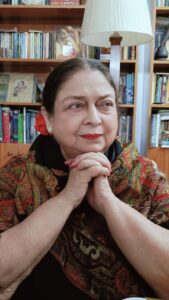INTERVIEWED BY RITUPARNA MUKHERJEE

RM: You have been a prolific and much-awarded writer. What motivates you to write at present? Which socio-cultural or political experiences move you to take up your pen?
NS: Whenever I find any mishaps or lawlessness that cause pain in our society, I have a very strong inner urge to write as this pain makes me creative.
RM: How has your extensive career as a journalist helped your literary career?
NS: f I had only been a literary writer then I would have to work harder to achieve fame. It was my writings both political and literary about the Middle East, especially Iran, that I received early and huge fame with a lot of respect and love.
RM: You have written variously on women’s issues, the struggles of the common people in negotiating their lives, communal conflicts, political issues, and urban loneliness. What has been your most satisfying work till date?
NS: It is very difficult to respond correctly to this question as I am still writing and have not moved away from literature to judge my own work.
RM: You are also an avid translator of Persian literature into Hindi. What moved you to take up translation and how would you compare your experience as a writer and that as a translator?
NS: Any piece of literature that provokes my thoughts, I translate it and desire others to read it. While studying the Persian language, I translated a French Story but I can’t remember the writer’s name. I translated small pieces from Rustom and Suhrab. During my visits to the Middle East, the spare time that I had after reporting, I preferred to read the Arab literature that I could get through English translations. I translated it as it was a pleasure for me to have found a new world and I wanted to share this pleasure with others.
RM: What challenges have you faced while translating Persian literature into Hindi? How similar would you say the two languages are in terms of their socio-cultural milieu?
NS: Although Indo-Iranian cultures are quite similar, we speak different languages. But there are many similarities. It was not a challenge to translate. A very famous Iranian poet had once asked me “How will you translate my poems? Many English and French translators have not translated in depth the socio-cultural tone of my country. ” I replied to him “Culturally we are very similar so we understand each other very well.”
I have not only translated from Persian but also rendered Arabic, Nepali, Mizo literature into English translations. However, I do not know what is the depth of these translations.
My style of translation is very simple. I try my best to translate exactly what the poet is conveying; I never try to add on to the work.
RM: Do you believe that translation has helped your own creative writing?
NS: It is like solving a puzzle, we play with words and language. Translation creates a different kind of pleasure. I have never really felt that translations have helped my creativity.
RM: How important would you consider the current propensity for translation of Hindi and Urdu literature for a global audience?
NS: When I started translating, at that point in time there were fewer translators. I was always reminded by others not to translate as I was a creative writer and that translators are considered secondary to writers. At that point, translators received no respect or money but many famous writers did undertake translations. In the last 15 – 20 years translators have gained respect, remuneration, and books are published with ease.
Tremendous global understandings have increased along with a human-to-human urge to know about each other and this has proved beneficial for translations.
RM: You have received the Sahitya Akademi Award in 2016 and the esteemed Vyas Samman in 2019 for two of your novels. How does it feel to be shortlisted for the Armory Square Prize for South Asian Literature in Translation for your novel Alpha-Beta-Gamma?
NS: Indeed, a surprise and a very nice surprise. Readers are very happy and in their happiness I am happy.
Recently I was awarded “The Excellence Award” for the Novel Alpha Beta Gamma by Aaj Tak Group on 26th November 2023. I feel that my stray dogs have received this award on whom the novel is based.
Also, read Forgetting is Not Really A Decision by Jaishree Roy, translated from The Hindi by Rituparna Mukherjee and published in The Antonym.
Follow The Antonym’s Facebook page and Instagram account for more content and exciting updates.


























0 Comments